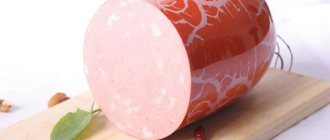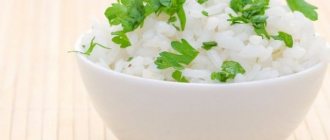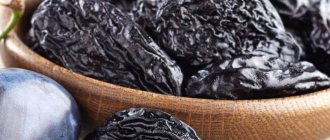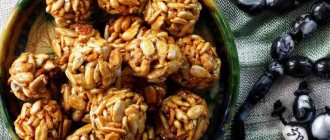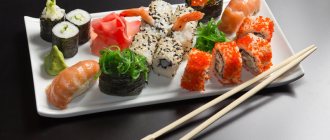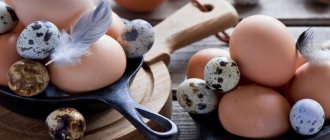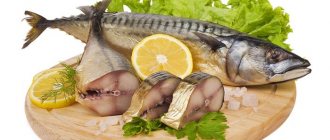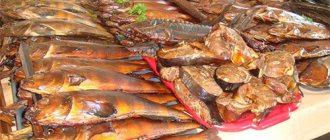Eating sausages during breastfeeding
After the birth of a newborn, a woman will certainly have to reconsider her diet and daily routine, because the health of the baby depends on her nutrition. They will be forced to remove many products from the menu, especially in the first two months after childbirth. This recommendation is associated with the risks of gastrointestinal disorders and allergic reactions in the infant. Can a nursing mother eat sausages while breastfeeding? The answer to this question cannot be unambiguous. High-quality sausages made exclusively from meat are incapable of causing harm, which cannot be said about products sold in supermarkets and spontaneous markets.
Can a nursing mother have sausages?
A carefully planned diet ensures the child's nutritional needs. In the first weeks, products should be introduced gradually to monitor the child’s body’s reaction. You can avoid the occurrence of allergic manifestations and disorders of the digestive system by eliminating the consumption of foods containing preservatives.
Sausages made from natural meat are healthy. They are classified as protein, which is characterized by easy digestibility. Natural sausages have a beneficial effect on the circulatory system.
Natural meat products are beneficial for breastfeeding
There are often sausages on sale that contain significant amounts of food additives that have a negative effect. Their use can cause poisoning of children's and mother's organisms. This indicates the need to carefully study the composition of products.
Important! During breastfeeding, you can eat sausages that are made in accordance with GOST rules.
Can I eat them while breastfeeding?
After the birth of a child, a nursing mother must follow a special hypoallergenic diet. All components containing spices, dyes, preservatives and other harmful substances are removed from the menu. Many products are banned for the first month, including sausages. Starting from the second month of breastfeeding, the mother’s diet can be significantly expanded, but it is better to exclude sausages.
There are often no useful substances in their composition; all the benefits of meat are spoiled by the manufacturer by adding preservatives and other additives that ensure storage and enhance the taste. Before answering the question whether a nursing mother can eat sausages, you need to carefully analyze their composition.
All sausage products contain no more than 30% meat if they are made according to GOST, and no more than 10% natural meat if it is made according to TU. The remaining volume is achieved by using cheap raw materials, such as ground bones, cartilage, fat and animal skin. Sausage contains grains, taste stabilizers, preservatives, thickeners and other substances that do not have the best effect on the human body, and especially on an infant.
Attention! The sausages contain soy - a natural plant product, but it seems so only at first glance. It is genetically modified and contains chemical compounds.
Sausages eaten by the mother will not benefit the newborn. You can only eat a product made from meat, but finding it on the shelves of all kinds of stores and supermarkets is not so easy, so you will have to prepare the meat dish yourself.
Is it allowed 1 month after birth?
Sausages are not able to benefit a woman’s body after childbirth. Her body is weakened, it requires additional nutrition, the menu can only contain healthy foods. It is better to eat clean meat, but not sausage. Failure to comply with this rule will lead to adverse reactions in the child and may cause a decrease in lactation. Against the background of a lack of nutrients, the female body experiences a lack of the hormone prolactin, the intensity of lactation decreases, and breastfeeding gradually stops.
Benefits for the mother
Sausages are a hearty, flavorful addition that goes well with any side dish: spaghetti, mashed potatoes and various grains. All sausages contain harmful substances:
- Sodium nitrate is a food additive that increases the shelf life of the product and improves the appearance of sausages; it turns into a carcinogen, increasing the risk of developing a tumor process.
- Salt - contained in the product in excess, is used by the manufacturer as a preservative. Excessive consumption increases the risk of developing diseases of the urinary system.
- Sugar leads to weight gain.
- Monosodium glutamate - increases the risk of hypertension and diabetes.
- Trans fats are vegetable oils processed through high technological processes into a solid substance. The human body is not able to digest it.
The benefits of use are imaginary. The vitamins and minerals indicated in the composition are unable to benefit the human body; their activity is reduced due to harmful substances.
Attention! Smoked and uncooked smoked products are considered the most harmful. Under the influence of high temperatures, the concentration of carcinogenic compounds increases.
Is it allowed to give to a child?
Despite the fact that supermarket shelves offer special children's sausages and sausages made with milk, you should not rush to introduce them into your child's diet. Their composition is considered more gentle and safe, but harmful components are not removed from it by the manufacturer.
Young mothers often panic if the child does not eat pureed meat or meat at all. Indeed, this is dangerous, because valuable protein enters the body along with the product. Sausages are not an adequate alternative because they contain minimal meat. You can feed a capricious baby only with homemade sausages.
From what age?
You can introduce sausages into your baby’s diet after he reaches the age of 1 year. This is the minimum age at which a child’s body is able to digest not the most healthy product, but it is better to wait until 3 years. Ideally, the product should be completely removed from the diet of a preschool child.
Benefits for the baby
Frankfurters and sausages contain a sufficient amount of harmful compounds, so it will not be possible to extract benefits from them for a child’s fragile body. Only products made from natural meat do not harm the body, but they are rarely sold to the population through a chain of stores. The lack of supply is due to the high cost of the product and short shelf life; sausage, created without preservatives, is stored in the refrigerator for no more than 3 days.
Harm to mother and baby
Often, nursing mothers are unaware of the harm they can cause to themselves and their baby by eating sausages. Having examined the composition, you can find out that the content of the meat component in it does not exceed 30%, the rest of the mass is represented by soy, preservatives, gelled fat and other unpleasant and unhealthy components.
Attention! Sausages are a semi-finished product, the consumption of which is excluded by the rules of healthy eating.
To ensure that the sausages have a pleasant taste and appearance, the manufacturer adds a lot of spices and spices to the composition. As you know, spicy and salty foods are prohibited during breastfeeding. Some sausages may contain garlic; if it enters the nursing mother’s body, the taste of the milk changes and the baby may refuse to breastfeed.
When consuming a low-quality product, the following reactions can be observed in the child:
- flatulence;
- allergic reactions;
- colic;
- digestive disorders;
- urinary disorders (due to the high concentration of salt in the composition).
Consumption is no less dangerous for the mother: due to the intake of a low-quality product, postpartum recovery processes in the body proceed with low intensity, and hormonal imbalances and other problems may occur.
Benefit or harm
Sausages are a delicious, filling addition to any side dish. For a woman caring for a small child, this is a real salvation, as they do not require much time to prepare and can be a wonderful lunch or dinner for the whole family. But can a nursing mother have sausages?
During lactation, a nursing mother should pay closer attention to her diet and exclude everything that could pose a danger to her health or the well-being of her baby. Sausages are a mixed product in this regard. High-quality expensive products with good composition can take their rightful place on a young mother’s table. But if the product is chosen incorrectly, then it will bring nothing but disappointment and trouble.
Most meat products called sausages contain only 10-15% natural high-quality meat
The main share is accounted for by soy protein or low-grade meat product, starch, fats, flavorings, water, thickeners, preservatives and the like. Of course, all this “chemistry” cannot be useful for the baby and the woman herself. In addition, artificial smoke flavor, flavor enhancers and spices in the product can negatively affect the taste of mother's milk, and the baby will simply refuse to breastfeed. Often chemical additives cause allergies, colic or diarrhea in the baby.
Another significant disadvantage of the product is its high calorie content - from 250 to 350 kcal per 100 g, depending on the brand. For women who have gained extra pounds during pregnancy, sausages will definitely not be beneficial. Therefore, it is not advisable to buy such meat products. It is better to give preference to inexpensive natural chicken meat; it will be much healthier if mother and baby are not allergic to it.
Important: All pediatricians and breastfeeding consultants agree that sausages and any other sausage products should not be consumed by nursing mothers.
Is there any benefit? Unfortunately, there are practically no positive qualities in sausages. They cannot be called a protein product, since there is absolutely no meat in them. Vitamins and valuable nutrients, if included in the composition, are in minimal quantities, which can be ignored. The advantages are the affordable price, pleasant taste and quick preparation of the dish.
Recommendations for use during lactation
To ensure that the product does not harm the child’s gastrointestinal tract, the following rules must be followed:
- sausages can only be eaten boiled;
- cook the product for at least 3 minutes, removing the shell;
- It is forbidden to eat fried sausages.
It is better to consume this product in the morning so that you can react in a timely manner.
How to properly introduce it into the diet?
Like any new product, sausages during lactation should be introduced gradually into the diet of a nursing mother. Having chosen a high-quality product and made sure that the rules for its storage are followed, you can eat no more than 50 grams at the first dose. This is necessary to control the baby’s reaction. If an allergic rash does not appear, colic and other disorders are absent, sausages can be consumed occasionally.
Daily and weekly norm
The daily consumption rate is no more than 200 grams of the product. It should be borne in mind that eating sausages every day is harmful and even dangerous. They can be eaten only in cases of extreme necessity, for example, if a woman does not have time to prepare herself a full lunch or breakfast, then a one-time dose will not cause harm.
With regular consumption of the product as food, the risk of adverse reactions in the baby from the gastrointestinal tract increases, therefore a nursing mother should remember the intake rates and basic rules for consuming sausages. Ideally, semi-finished products should not be in the diet of a nursing mother; it is better to replace them with dishes made from natural meat, but sometimes it is permissible to deviate from this rule.
Source
How to choose the right sausages for a woman during breastfeeding
When you come to the meat department of a store or supermarket, first of all pay attention to the category of expensive products. Such products usually have a more natural composition, they contain more meat and fewer harmful substances. A nursing mother should not eat cheap sausages even to save money - the risk of food poisoning or an allergic reaction in the baby is too great.
But choosing an expensive semi-finished product is only half the battle. Be sure to read the chemical composition of the product listed on the wrapper. Naturally, if there is a minimum of meat inside the delicacy and at the same time there are preservatives and flavor enhancers in abundance, it is better to refuse it immediately.
The above-mentioned milk sausages are practically the best choice if you are breastfeeding your baby. You can also pay attention to high-quality boiled sausages made from lean meats and “Children’s” semi-finished products.
You cannot buy ham products, as well as raw and smoked sausages, spicy and spicy varieties of sausages, sausages with lard, and so on.
In their appearance and composition, delicacies “allowed” for a nursing mother most resemble doctor’s sausage. But beware, if the milk sausages have an overly pink tint, it means a lot of food coloring has been added inside.
Of course, it is necessary to familiarize yourself with the date of manufacture of the product, as well as its shelf life. The latest figures, by the way, will clearly demonstrate the degree of naturalness of the sausages. If they can be stored for a very long time, for example longer than one week, then there is practically no real meat inside them.
